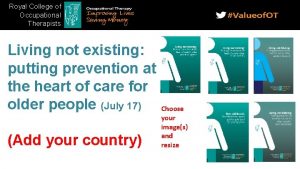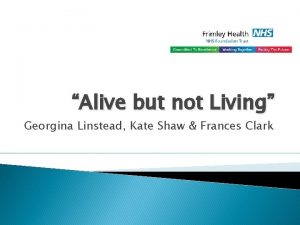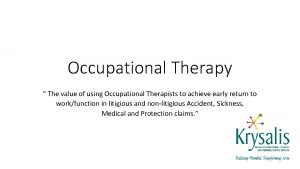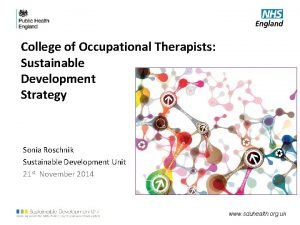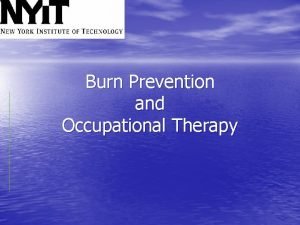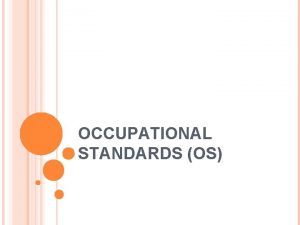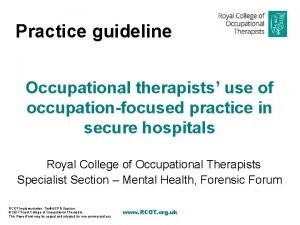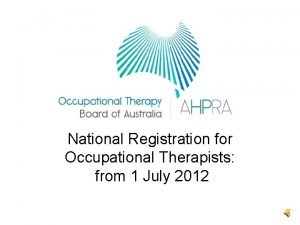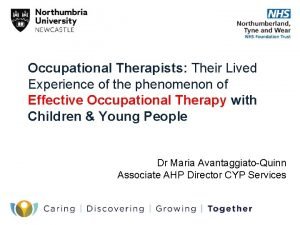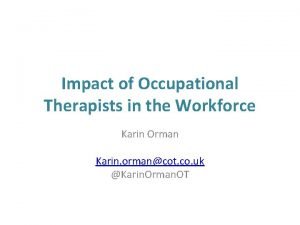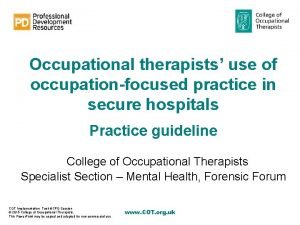Royal College of Occupational Therapists Living not existing






























- Slides: 30

Royal College of Occupational Therapists Living not existing: putting prevention at the heart of care for older people (July 17) (Add your country) Choose your image(s) and resize

Royal College of Occupational Therapists Why now? The RCOT campaign Occupational Therapy – Improving Lives Saving Money is making the case for occupational therapists in three key pressure points in NHS and care services: • NHS and care services reaching a tipping point across the UK • People with commissioning powers under extreme pressure • Critical in this climate that occupational therapy states how it is 1. 2. Improving lives and Saving money for public purse

Royal College of Occupational Therapists Policy Drivers in England Sustainability and Transformation Plans (STPs) • • • Submitted in June to be actioned in the autumn 44 STP footprints Combined health and social care approach to meet local population needs. Shift to place based systems approach. Combine resources, create alliances and partnerships - relationship centred delivery of care. Move away from competition as driver for care.

Royal College of Occupational Therapists Policy Drivers in Wales The Social Services and Well-being (Wales) Act • • • Duty to promote wellbeing and take a preventative approach People have control over what support they need, making decisions about their care and support Carers have an equal right to assessment for support. Easy access to information and advice Stronger powers to safeguard people Local authorities and health boards work together in new statutory partnerships to drive integration, innovation and service change

Royal College of Occupational Therapists Policy Drivers in Scotland Public Bodies (Joint Working) (Scotland) Act 2014 • • Live from 1 st April 2016 Are integrated from the point of view of service-users Take account of the particular needs of different service-users within the local population and their participation in the community. Respects the rights and dignity of service-users Protects and improves the safety of service-users Are planned and led locally in a way which is engaged with the community and makes the best use of the available facilities, people and other resources Best anticipates needs and prevents them arising 9 National Health and Wellbeing Outcomes to drive quality improvement across health and social care.

Royal College of Occupational Therapists Policy Drivers in Northern Ireland • Quality 2020 (Nov 2011) A 10 year strategy to protect and improve quality in health and social care Northern Ireland Safe and Effective • Transforming Your Care (Dec 2011) A Review of H&SC in Northern Ireland • Personalisation, independence and integration • Making Life Better – A Whole System Framework for Public Health 2013 -2023 Prevention and tackling inequalities • Systems, Not Structures, (2016) Changing Health & Social Care Expert Panel Report ‘Accountable Care Systems’ to integrate, Triple Aim Objective (population health, experience of care and per capita cost) • Health & Wellbeing 2026 (2016) Delivering Together

Royal College of Occupational Therapists Northern Ireland (continued) 12 key principles of Transforming Your Care • • • Individual at centre Evidenced based services Right care right place right time Population- based planning of services Prevention focus and tackling inequalitites Integrated care • Promoting independence and personalisation of care • Safeguarding most vulnerable • Ensuring sustainability of service provision • Realising value for money • Maximising use of technology • Incentivising innovation at a local level

Royal College of Occupational Therapists ‘The social care system is facing unprecedented pressure and is broken’ Julia Scott, Chief Executive Officer, Royal College of Occupational Therapists We must focus on creating services that help older people to do as much as they can for themselves. This can be achieved by • Prevention or delaying the need for care and support • Helping older people remain in their communities • Ensuring equality of access to occupational therapy Those that receive help from an occupational therapist are more likely to be able to adapt successfully to change and manage the consequences of fragility and ill health – and remain independent.

Royal College of Occupational Therapists Occupational therapy • Occupational therapy provides practical support to enable people to facilitate recovery and overcome any barriers that prevent them from doing the activities (occupations) that matter to them. • This helps to increase people's independence and satisfaction in all aspects of life. "Occupation" refers to practical and purposeful activities that allow people to live independently and have a sense of identity. This could be essential day-to-day tasks such as self-care, work or leisure.

Royal College of Occupational Therapists Why occupational therapists? • Occupational therapists are unique as they are trained to work in both health and social care and also work across mental and physical health • Investing in occupational therapy has the potential to improve care quality without increasing overall spending

Royal College of Occupational Therapists Living not existing: putting prevention at the heart of care for older people (July 17) • The evidence for the reports was gathered from data examples from services around the UK • The College has published four reports one for each UK nation

Royal College of Occupational Therapists Living not existing: putting prevention at the heart of care for older people Publication 13 July 2017 Briefing meeting at the Shard kicked off with a national debate how to deliver on prevention with key stakeholders

Royal College of Occupational Therapists Living not existing: putting prevention at the heart of care for older people The report is supported by a film for the public and stakeholders has been produced to show the difference occupational therapy can make. Available on You Tube https: //youtu. be/8 S 7 P 0 ON 9 w 1 A or can be downloaded from: http: //mbf. me/Xp 8 e 0 M

Royal College of Occupational Therapists Living not Existing - Messages Deploying more of the occupational therapy workforce in primary their skills to intervene early care to use Occupational therapists are a limited resource. We can be more effective in addressing the needs of the local population by training and supervising others to be competent to deliver on aspects of traditional practice – minor adaptations, practising skills in activities of daily living. e. g. Trusted Assessors, Health & Work Champions We need to support developing wider partnerships for further innovation. Occupational therapists can act as catalysts for addressing needs beyond traditional health and social care, such as poor housing and social isolation.

Royal College of Occupational Therapists Living not Existing: recommendations for England

Royal College of Occupational Therapists Living not Existing: recommendations for Northern Ireland

Royal College of Occupational Therapists Living not Existing: recommendations for Scotland

Royal College of Occupational Therapists Living not Existing: recommendations for Wales Please choose the Welsh or English one and resize

Royal College of Occupational Therapists We have chosen some data impact examples on the following slides. You can add local examples or other relevant report examples if this will be helpful. All the examples are in the reports if you need further detail

Royal College of Occupational Therapists Demonstrating the value of occupational therapy The reports showed the following… Flint County Council Occupational therapists have enabled an average of three people a year to move from residential care to a suitable home. SAVING: £ 123, 781. 32

Royal College of Occupational Therapists Demonstrating the value of occupational therapy Kent Reablement at Home Teams Nine teams across the country 83% of people seen are able to live independently at home SAVING: £ 3. 2 million

Royal College of Occupational Therapists Demonstrating the value of occupational therapy The Bridgeway Service: An occupational therapy and reablement programme enabled Mr Evans to stay at home and keep active in his community. . SAVING: £ 34, 620 annually

Royal College of Occupational Therapists

Royal College of Occupational Therapists

Royal College of Occupational Therapists

Royal College of Occupational Therapists Add some local practice examples here or choose some from the report in areas where you wish to develop services. Choosing ones showing savings has a great impact You can use the impact data guidance on the microsite to help you http: //cotimprovinglives. com/tell-your-story/

Royal College of Occupational Therapists In summary Occupational therapists should be commissioned with work older people as they begin to become frail. Helping in small ways early on, can prevent or delay the need for more intensive support following a crisis. This enables people to Live, not just Exist while also saving money for services

Royal College of Occupational Therapists ADD A LOCAL SUMMARY – WHAT ARE YOU ASKING FOR ETC e. g. ask the audience to consider how they can adopt the recommendations in services How can they help with taking the report forward

Royal College of Occupational Therapists For further information contact: ADD YOUR CONTACT DETAILS

Royal College of Occupational Therapists
 Royal college of occupational therapists
Royal college of occupational therapists Living not existing
Living not existing Client centered therapists try to appreciate
Client centered therapists try to appreciate Which of the following therapists would most likely
Which of the following therapists would most likely Disadvantages of statutory interpretation
Disadvantages of statutory interpretation Thomas tay
Thomas tay Royal military college of science
Royal military college of science Royal college of obstetricians and gynaecologists
Royal college of obstetricians and gynaecologists Royal college of nursing v dhss 1981
Royal college of nursing v dhss 1981 Acat jrcptb
Acat jrcptb Group 2 specialties
Group 2 specialties English 9 vocabulary unit 1
English 9 vocabulary unit 1 Venn diagram living and nonliving things
Venn diagram living and nonliving things Is tomato living or nonliving
Is tomato living or nonliving Living non living dead
Living non living dead The smallest living unit within the human body is
The smallest living unit within the human body is Defects of curriculum of secondary school level
Defects of curriculum of secondary school level Similarity of ending sounds existing between two words
Similarity of ending sounds existing between two words Gym management system uml diagrams
Gym management system uml diagrams Cima practical experience time limit
Cima practical experience time limit Hipaa pre-existing condition protections
Hipaa pre-existing condition protections Refactoring improving the design of existing code
Refactoring improving the design of existing code Organization chart of pnp
Organization chart of pnp Market penetration chart
Market penetration chart Existing process
Existing process Existing securities are traded
Existing securities are traded Good thesis
Good thesis Alive but not living
Alive but not living Wake tech admissions
Wake tech admissions Early college high school at midland college
Early college high school at midland college Classification of sakuting
Classification of sakuting

